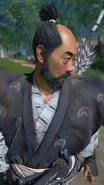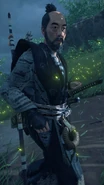One arrow, one death!
― Sadanobu Ishikawa
Sensei Sadanobu Ishikawa (石川 定信; Ishikawa Sadanobu) is a supporting character in Ghost of Tsushima. He is a samurai and renowned archer. He is one of several companions who helps Jin Sakai to defeat the Mongol army.
Biography[]
Ishikawa is a renowned samurai archer who formerly served under Clan Nagao of Tsushima. He taught one of their members, Hironori Nagao, the Way of the Bow. However, Hironori proceeded to use the Way of the Bow maliciously, starting a rebellion in order to take control of the clan. Hironori's rebellion failed and he was executed for his betrayal, but not before killing many of the clan's best men. In order to protect Clan Nagao's legacy, the clan fabricated a story that Hironori had instead been killed honorably fighting a pack of bandits. Ishikawa was blamed for enabling Hironori's betrayal, but was allowed to peacefully resign from his service to Clan Nagao.
Ishikawa lived in seclusion in Hiyoshi Springs until a peasant girl, Tomoe, came to his dojo in order to receive training. Though reluctant, Ishikawa came to recognize Tomoe's talent for archery, and decided to accept her as his second student, in the hopes of training her into becoming a samurai and his heir. With Ishikawa's teachings, Tomoe turned from a common peasant into a deadly archer.
At some point before the Mongol invasion, Ishikawa had learned that Tomoe had been in league with a band of assassins and using her training maliciously. In response, Ishikawa plotted to kill Tomoe and the two had fought, and in the process Ishikawa was prevented from participating in the Battle of Komoda Beach.
Tomoe later sided with the Mongol invaders and began teaching them the Way of the Bow. After ambushing Fort Nakayama, Ishikawa reluctantly allows Jin Sakai to become his third student, training him how to use the bow.
While Jin helps Ishikawa find and capture Tomoe, Ishikawa is revealed to be an abrasive, callous and unforgiving sensei; he willingly enables Jin to walk right into a Mongol ambush, uses a peasant woman to scout Tomoe's camps which gets her killed, and even suggests sacrificing his home village, Hiyoshi Springs, in order to bait Tomoe out. Jin criticizes Ishikawa for his dishonorable behavior, believing that Ishikawa had pushed Tomoe into betraying him.
Ishikawa ends up assisting Jin in the attack on Castle Kaneda, and later Castle Shimura. Later, Jin finds Tomoe, disguised as a trapper, "Matsu", in Kin Prefecture. She admits that she was captured by the Mongols and decided to teach them the Way of the Bow in order to keep herself alive, and that the prisoners that were brutally murdered in Fort Nakayama were given a quick and merciful death by her hand. She asks Ishikawa and Jin to defeat the Mongols at Umugi Cove for her to atone for her crimes, which Ishikawa and Jin uneasily accept.
The three manage to fend off the Mongol attack on Umugi Cove, before Tomoe manages to get on a boat to escape Tsushima. Before Ishikawa could shoot Tomoe, he finds a note she left for him and he decides to spare Tomoe after reading it, allowing her leave to start a new life on the Japanese mainland. After the ordeal, Ishikawa tells Jin that he has nothing left to teach him, other than to not repeat his mistakes.
Ishikawa finally helps Jin in the penultimate assault on Port Izumi, where Jin confronts and defeats the Mongol leader, Khotun Khan.
Personality[]
At his best, Ishikawa is a rigid and easily disagreeable person; at his worst, he's a cynic who can go back and forth on his claims when pressured to protect his dignity and pride; he denied being the mentor of Hironori Nagao at first, only to later confirm it on accident. He also lied about the real story behind his retirement and Hironori Nagao's fate, and even never fully disclose about how he was being "harsh" towards Tomoe during her time as his student.
Ishikawa was also prone to hypocrisy during his pursuit of Tomoe: He criticized Jin's recklessness and ruthless method in dealing with the Mongols early in his Tales, but later went on to rush into Tomoe's archer's trap and later even got a peasant woman killed after he assign her as his scout just so he can catch on Tomoe's whereabouts. Ishikawa later tackles this topic by telling Jin that he "shouldn't expect his elders to be perfect".
Ishikawa used to think very lowly of Tomoe as a person and built assumptions of her Mongol archer's deed to be solely based on her supposed psychopathic mindset, sadism and megalomania; these assumptions were later challenged by Tomoe's side of the story in which she claims to lost power over her own archers and that her killings were alternatives to worse fates. Ishikawa persisted on his views and wasn't ashamed to openly warn Jin of Tomoe's possible treachery at every chance when the three of them work together.
Despite his shortcomings, Ishikawa seems to possess a great deal of wisdom, one of them being his firm belief that a true Samurai must know restraint and realize that they have a role beyond just being killers; a wisdom he lives up to when he decided to retract from shooting Tomoe after she tried to redeem her wrongs and declared her departure from her old life in Tsushima. When reflecting on his life, Ishikawa had not regretted his career as a samurai and the level of renown he had built up, though laments that he had not taken the time to settle down and raise a family.
Tales[]
Ishikawa tales[]
Trivia[]
- The English voice actor is François Chau.[1] He best known for his role as Dr. Pierre Chang in ABC's Lost.
- Mongol Archers met during Ishikawa's Tales are unique from the rest of the game as they do not signal before firing and even having considerably higher rate of fire in later Tales.
- His name is probably inspired by Takeo Ishikawa, a leading Kyudo master.
- His full name, Sadanobu Ishikawa (石川 定信, Ishikawa Sadanobu), is only revealed at the epilogue of the game, where Jin reads over a scroll that acknowledges Jin as his student once the player completes all of Ishikawa's Tales.
- In regards of his name, Ishikawa's tale during the game can be considered ironic, as "Sadanobu" can roughly mean "to trust", whilst the theme of his tales seem to center around mistrust and deception.
Gallery[]




